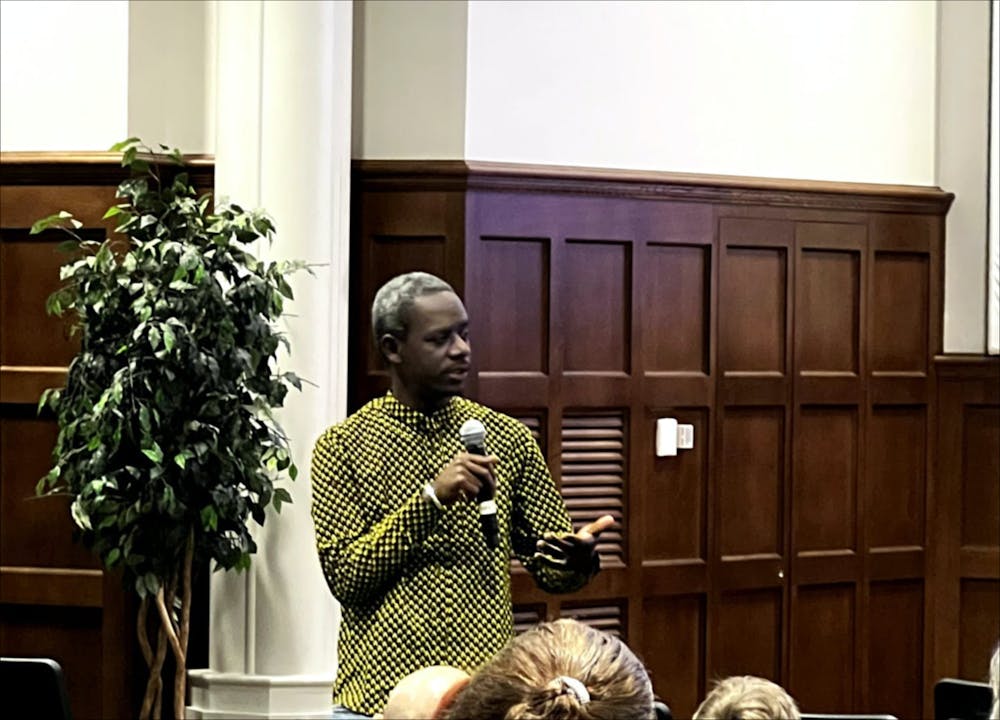More than a hundred students gathered in the Ukrop Auditorium in the Robins School of Business for the 16th annual African Film Weekend in early September to catch the authenticity of the exhibited African stories.
Because of the COVID-19 pandemic, this African Film Weekend was the first event in three years. The festival drew a large crowd. The glamor of landscape and the intertwining of tradition and modernity have made African films take the world by storm in 2023.
“Even though the weekend was packed with other events, a lot of students still managed to come, and that is what is important,” event organizer and UR professor of French Kasongo Kapanga said. “We would have loved to have more, but we have more events planned.”
The first documentary that premiered at the festival was “You Will Die at Twenty,” a gripping modern parable where tradition and progression collide to produce an almost mystical drama.
Directed by Amjad Abu Alala, the documentary was particularly relevant because it delves into the archaic beliefs and superstitions that have existed in South Sudan since time immemorial and their psychological effect on victims.
It was followed by “La Colère Dans Le Vent (Anger in the Wind),” a documentary directed by Amina Weira in Niger that exposed the silent price inhabitants in the mining town of Airlit pay with their health due to the exploitation of Uranium in their village by a French company Areva.
Then came Aicha Elhadj Macky’s “L'arbre Sans Fruit (The fruitless tree).” It is a documentary about the souvenir of marriage being procreation and motherhood. It nails the central claim that the remedy of barrenness involves divorce, polygamy or social scorn in Niger.
“I made this film to give voice to all women suspected of being infertile,” Macky said, in an interview with Moving Stories.
Macky also mentioned how the reason why the issue was difficult to address was because it is a taboo topic- the unsaid and the unspoken, therefore the lines are not clearly defined. “Atlantique (Atlantics)” by Mati Diop was the fourth film to be screened in the 2-day long festival. It is a romantic drama based in Dakar. The film is hinged on a man who departs from his girlfriend without bidding goodbyes, leaving her with the difficulty of wrestling with her feelings for him. In the audience, this was one of the less intense films screened as it lessened the tension so thick that you could cut with a knife.
The last to be screened was “The Wedding Party,” directed by Kemi Adetiba. It features conflicts of interest in a lavish wedding. It populates its cast with a roll call of popular faces that could pass for a veritable all-star cast.
Analyzing this movie, movie critic Esosa Omo-Usoh said, “As is in most Nollywood movies, there were moments of incongruity in this movie, pointless gags and scenes that just beggared belief. Nevertheless, it shows so much potential that African filmmakers have. It was a masterpiece!”
The event ended with satisfaction and various talking points, coupled with a mixture of emotions from the entirety of the students and guests.
Enjoy what you're reading?
Signup for our newsletter
The screening of the African films served its ultimate purpose, which according to the organizers was to reflect on the ways African and African Diasporan communities depict themselves in facing the challenges generated by various internal and external social, political and economic dynamics specific to the global society.
“This is a diverse university,” Kapanga said, “and it was a cultural and educational event for students to watch the most recent African films to educate them on issues taking place in Africa.”
Students shared the same sentiment.
“I think African film-making ultimately explains real themes in a creative manner that you probably wouldn’t see as often in American films,” first-year Ebony Jordan.
Contact contributing writer Bongani Mwonzora at bongani.mwonzora@richmond.edu.
Support independent student media
You can make a tax-deductible donation by clicking the button below, which takes you to our secure PayPal account. The page is set up to receive contributions in whatever amount you designate. We look forward to using the money we raise to further our mission of providing honest and accurate information to students, faculty, staff, alumni and others in the general public.
Donate Now



